Ruminating with Bob Woodward and Carl Bernstein
The dynamic duo who brought down Nixon talk about Watergate, Trump and the future of democracy.
I was in high school nearly 50 years ago when I read All the President’s Men and saw the terrific movie. While it would be an exaggeration to say that the thrilling tale of Washington Post reporters Bob Woodward and Carl Bernstein cracking the Watergate story changed my life, impacted my decision to choose journalism. This is true of many journalists of my generation. After also co-authoring The Final Days, an amazing account of Nixon leaving office, Bob and Carl have written separately, with Bob more focused on gripping inside accounts of recent presidencies and Carl on well-written biographies and memoirs. On October 26th, I moderated a conversation with them on stage at the New Jersey Performing Arts Center. There’s no video available, but these excerpts should give you a sense of the fun and revealing evening.
JONATHAN ALTER:
Before we talk about Watergate: Carl, you are a journalist and also a Jew. So, how hard has it been for you in the last few weeks to process all of this and keep your journalistic detachment?
CARL BERNSTEIN:
I’m a secular Jew. I covered the ’82 war when Israel went up through Lebanon and the consequences of that war. As a Jew, I’m sometimes dismayed by some of what I see. At the same time, Israel is something that all Jews should take pride in, and it has an importance to the Jewish people that is deep and abiding.
I wrote a memoir about my family — a leftwing family of secular Jews. The FBI came to my bar mitzvah to take down license plate numbers. But I think it's important as a journalist to talk about some realities that the American press often doesn’t get, one of which is that Likud isn’t Israel. Both as a Jew and as a reporter, I believe there is a logic and an inevitability to a two-state solution — something that Likud and Netanyahu have worked very hard to prevent.
JON:
Bob, you spent more time with Trump in the White House than any other reporter.
BOB WOODWARD:
And on the phone. In the last year of the Trump presidency, he agreed to do these interviews. He could call anytime, I could call anytime.
CARL BERNSTEIN:
I can’t get you on the phone because you're talking to Trump.
JON:
You said your wife got tired of you calling him.
BOB WOODWARD:
It’s a very interesting experience for a reporter to have that kind of relationship. The problem in the Trump case — and this is not a political judgment but an empirical warning out of his mouth — was that he was irresponsible in responding to the Coronavirus. It took me months to find out, but he got a particular warning from people who knew the most, and he lied and covered up.
“… he was irresponsible in responding to the Coronavirus. It took me months to find out, but he [Trump] got a particular warning from people who knew the most, and he lied and covered up. “
In July, four months before the reelection, I called him and said, “Well, things are pretty bad, aren’t they?” And he said, “What do you mean?” And I said, “The virus.” And he said, “It’s under control.”
At that point, 140,000 people had died in our country, in his country. He knew that he could have issued a warning. And I just kept asking, “What’s the plan?” And he said no one would remember. And I said, “Come on, this is bad. You haven’t done the job of the president, which is to protect the people.” And he said, “Well, I have a plan.” Which he didn’t.
JON:
What do you think the odds are he’ll get re-elected?
BOB WOODWARD:
Too high. His four years as president are training wheels for him. And if he becomes president again, interviewing for Secretary of Defense or any job, he’ll do it the same way: Get down on your knees, I want total loyalty, do what I say.
JON:
With retribution as his watchword.
BOB WOODWARD:
He's disconnected from democracy's basic premise. He doesn't like democracy because it’s about other people, and he only cares about and focuses on himself.
“He's disconnected from democracy's basic premise. He doesn't like democracy because it’s about other people, and he only cares about and focuses on himself.”
JON:
Carl, would the Watergate story even be possible to report today? Wouldn't Fox just put up a chyron that said “Assault on the Presidency,” and half the country wouldn't absorb any of what you reported?
CARL BERNSTEIN:
It definitely would be reportable today. We've had great reporting on Donald Trump and the presidency, not just books by Bob but reporters covering the White House. It’s probably the greatest White House reporting by many of the Washington press corps of any presidency in my lifetime. Your question implies something else, and that is: What would the result be? And the result might be quite different. It might go up in the ether.
We have a different country today. People in this country are increasingly looking for news and information to reinforce what they already believe. Early on, we were asked, “What kind of reporting are you guys doing?” And we came up with the idea of calling it “the best obtainable version of the truth.” And I think there is far less interest in today's best obtainable version of the truth.
There’s also a corollary to that. And that is, the truth is not neutral. We’ve been yoked to this idea in the press that our job is to give 50 percent of the story to one side, 50 percent to the other, and be done with it. In many regards, the most important thing a journalist, a reporter, or a news editor does is decide what is news. We made a decision at the Washington Post [when Watergate started] that what we were reporting was news.
BOB WOODWARD:
We would write a story and say: there’s this massive campaign of sabotage and espionage that Nixon and his people are behind aimed at the Democrats, and then we'd call the White House and say, “What do you think?” And they’d say, “Oh, a bunch of lies and untruths.” And then we’d give them their paragraph.
CARL BERNSTEIN:
Exactly. It was not 50 percent. What happened in Watergate was [we had] a criminal president of the United States who established this huge, vast campaign of political espionage and sabotage to undermine the very basis of American democracy: the electoral system. Sound familiar? And so what happened? The press did its job to the point where the American people could not ignore the facts in front of them. And gradually, Nixon, who maintained a very high favorability polling up until the discovery of his tapes and the Saturday Night Massacre — how many people here know? The [50th] anniversary was [October 21]...
BOB WOODWARD:
Because we’re old people.
CARL BERNSTEIN:
So, the press did its job. Then, because of what was appearing in the press, a Senate investigating committee headed by Sam Ervin, the senator from North Carolina, undertook a historical investigation that produced a record of Nixon's crimes on tape, and then the Articles of Impeachment were brought against Nixon by the House Judiciary Committee. Republicans cast the key votes in those articles of impeachment. It became a bipartisan consensus that this was a criminal president of the United States, unlike what we have seen with Trump.
BOB WOODWARD:
Barry Goldwater, the conscience of the Republican Party; Hugh Scott from Pennsylvania, the Senate Republican leader; and John Rhodes, the Republican House minority leader from Arizona, went to see Nixon on August 7, 1974, after the Smoking Gun tape [came out]. The President’s own party rose up and said, “Too many crimes, too many lies, we’re not going to go along with this.” The next day, Nixon resigned.
JON:
Carl, you reported that most Republican members of the Senate despise Trump and think that he's a menace to the Republic, but they don't have the courage to do what Barry Goldwater did. Is that right?
CARL BERNSTEIN:
And then some. I've been covering this story for four years. Republican senators would take you over in the corner and tell you how they despised him, how they were afraid of [Trump], always off the record. But I also talked to their aides. And the aides were even more adamant about what their bosses felt. Finally, I decided I'm not bound by confidentiality — I'm going to do this story. So I did it [in November of 2020] and named 21 Republican senators who held Trump in contempt. There may have been one denial, and he was lying.
The next day, I got a call from a former Republican senator who had served very recently, who said, “Carl, the number is really close to 40 of the Republican senators.”
There have been three great Congressional investigations in my lifetime: the Army-McCarthy hearings, the Senate Watergate Committee hearings, and the Bennie Thompson/[Liz] Cheney-led January 6 hearings. The great difference in the legislative branch today is these senators and the House Republicans, who are really an extension of MAGA. We've had a cold civil war in this country for 35 years. Trump ignited it; there is no question about that. But it's not happening in a vacuum in Washington. This is about half the country voting for Donald Trump. 70 percent of people who identify themselves as Republicans still go along with what he says. We need a different approach from saying, “Oh, it's just these guys in Congress.”
JON:
February will mark 50 years since the publication of All the President’s Men. Even though we know a lot more now, it's still great storytelling, and then you guys do it again in The Final Days.
CARL BERNSTEIN:
I’m sitting here thinking, “We were 30 years old then!”
JON:
Len Downie, who was the boss at the Washington Post after Ben Bradlee, wrote that you two actually didn't get along very well for various parts of it.
BOB WOODWARD:
For 50 years!
CARL BERNSTEIN:
If I could get him on the damn telephone, it would be a lot easier.
JON:
To outsiders, you look a lot like Mutt and Jeff. Everyone, including you guys, accepts that Carl is the superior writer and Bob is the superior reporter, so there wasn't a lot of confusion about that.
CARL BERNSTEIN:
That's confusing.
JON:
Do you disagree with that?
CARL BERNSTEIN:
You can see the two of us are joined at the hip after 50 years. One of the amazing things about the relationship is that we switch the expected roles now and then. He can write a sentence that will knock your socks off.
BOB WOODWARD:
But not a paragraph. [Laughter]
You have to take what you can get. It was Carl's idea to write the book. We wrote some chapters, but Watergate was unfolding so fast that we couldn't keep up. So I said, “We're gonna have to follow the first rule of journalism: write about what you know. And we know our own experience. Let's write it this way.”
You [Carl] thought it was going to be a big ego trip, and it couldn't be. So I grabbed some chapters, and we looked at it, and we said, “As long as we tell the truth about our mistakes and [explain] the basic lesson of the Nixon presidency, which is: he would never come clean.” And so when we made mistakes, when there were jokes —we put them all in the book.
JON:
You talked about how you tried to get grand jurors to talk, which was a mistake.
BOB WOODWARD:
It might have been a mistake; maybe not.
CARL BERNSTEIN:
I still want to say there's no law against it.
JON:
[Legendary editor] Gene Roberts said this was the greatest reportorial feat ever. Carl, at one point, you knock on the door of a bookkeeper and talk your way into the house with a cigarette. How did you do that? Would it work nowadays?
CARL BERNSTEIN:
You do the same thing. Today, we have Google and all kinds of tools that Woodward and I didn't have back then to help get us out there and do what we needed to do: knock on doors. You look at the movie All the President’s Men, and what do you see? You see these two young guys who are knocking on doors, and not just of Democrats. All of our major sources were Republicans — most had worked for or supported Richard Nixon.
BOB WOODWARD:
You saw the movie version where Dustin Hoffman played Carl. No one ever looked more needy if you saw the movie — or you can imagine it. [Laughter] You know, you used to be able to get dates because of sympathy.
CARL BERNSTEIN:
Tough customer.
BOB WOODWARD:
That needy look. No? You don’t think so?
CARL BERNSTEIN:
Yeah, I look needy. I need to know what the hell happened. “Madame Bookkeeper, tell me what the hell happened. We heard you are very uncomfortable with some things you have seen.”
“People respond when you're looking for the best obtainable version of the truth — not all of them, but if you’re straightforward, and you're a good listener, experience shows that this basic methodology, even today, is still how to get the information as reporters.”
People respond when you're looking for the best obtainable version of the truth — not all of them, but if you’re straightforward and a good listener, experience shows that this basic methodology, even today, is still how to get the information as reporters.
The first hugely important story we wrote about the Watergate undercover activities by Nixon's reelection committee was largely from this bookkeeper. And then four other people who knew about a secret fund that paid for the undercover activities.
One of them was John N. Mitchell, the former Attorney General of the United States, Nixon’s former law partner, and his campaign manager. And we had learned he controlled this secret fund. So we did a story saying, “John Mitchell, while Attorney General of the United States, controlled a secret fund that paid for these activities.” And Ben Bradlee came to Woodward and me and said, “I'm not going to ask you who your sources are, but you got to have multiple sources on this. You got it?” We said, “Yes.” He said, “There's never been a story like this before. You're about to say that the former Attorney General of the United States is a crook, a man as close to Richard Nixon as there has been.”
BOB WOODWARD:
And he said, “And you better be right.”
CARL BERNSTEIN:
I called the White House that night and got a Deputy Press Secretary, and he said, “Okay, here's our response: “The sources of the Washington Post are a fountain of misinformation.” I typed it out. And I said, “Yes.” He said, “That's it.” I said, “Wait, aside from this geyser that you think has gone off in our backyard, is the story accurate? Did Mr. Mitchell control those funds? Were there such funds?” “The sources in the Washington Post are a fountain of misinformation,” he repeated.
By then, we had come to call this “the non-denial denial”: to try and make our conduct the issue in Watergate rather than the conduct of the President and, in this case, his men. I had a phone number for John Mitchell in New York, and I thought I could reach him. I called him, and he answered the phone. I said, “Mr. Mitchell, I have a story we're putting in the Washington Post tomorrow. I'd like to read it to you and have your response.” He said, “Go ahead.” So I read it to him: “John N Michell, while Attorney General of the United States, controlled a secret fund.”
And he goes, “Jeeeeesus!”
JON:
And you called him about 11:30 at night? Nowadays, the chances of getting through to anyone at any hour are slim.
CARL BERNSTEIN:
Well, it helped that he drank. He was a little bit on the sauce that night. So, I continued and got to the end of the first paragraph. He said, “Jesus Christ, all that crap — you're putting that into the paper? If you print that, Katie Graham,” referring to the great publisher of the Washington Post, Katherine Graham, “is gonna get her tit caught in a big fat wringer.”
And I kind of instinctively jumped back from the phone, more worried about my parts than Mrs. Graham’s because I wasn't used to talking to attorneys general, I guess. And then he said the most chilling words [I’ve heard] in the 64 years I’ve been reporting. He said, “When this campaign is over, we're going to do a little story on you two boys,” he hung up the phone. And the threat was real. I don't know exactly what he meant, except it was indicative of his attitude and the Nixon White House attitude toward a free press. Whether he was talking about bodily harm, whether he was talking about trying to take away the television licenses of The Washington Post Company, the financial lifeblood of the company, which they tried to do —I don't know.
So I called Ben Bradlee and told him what Mitchell had said. And he said, “He really said that about Katharine? All right, put it all on paper but leave out her tit.” The next morning, Mrs. Graham came up to me and said, “Carl, do you have any more messages for me?”
JON:
I worked for Mrs. Graham for 28 years [at Newsweek, also owned then by the Washington Post Company]; of course, you guys worked for her for a long time. In [the movie] The Post, Meryl Streep inhabits her like Jason Robards does with Ben Bradlee and Dustin Hoffman does with you, Carl, in All the President’s Men. I’m not sure I could say the same thing about Robert Redford and you, Bob.
CARL BERNSTEIN:
I didn't say it!
BOB WOODWARD:
You have no idea how many women are disappointed. During this period, I could get a date with anyone on the telephone.
CARL BERNSTEIN:
And then you gotta knock on the door.
BOB WOODWARD:
And they go: “Who are you?” [pause] I’ve never seen such disappointment.
[Laughter]
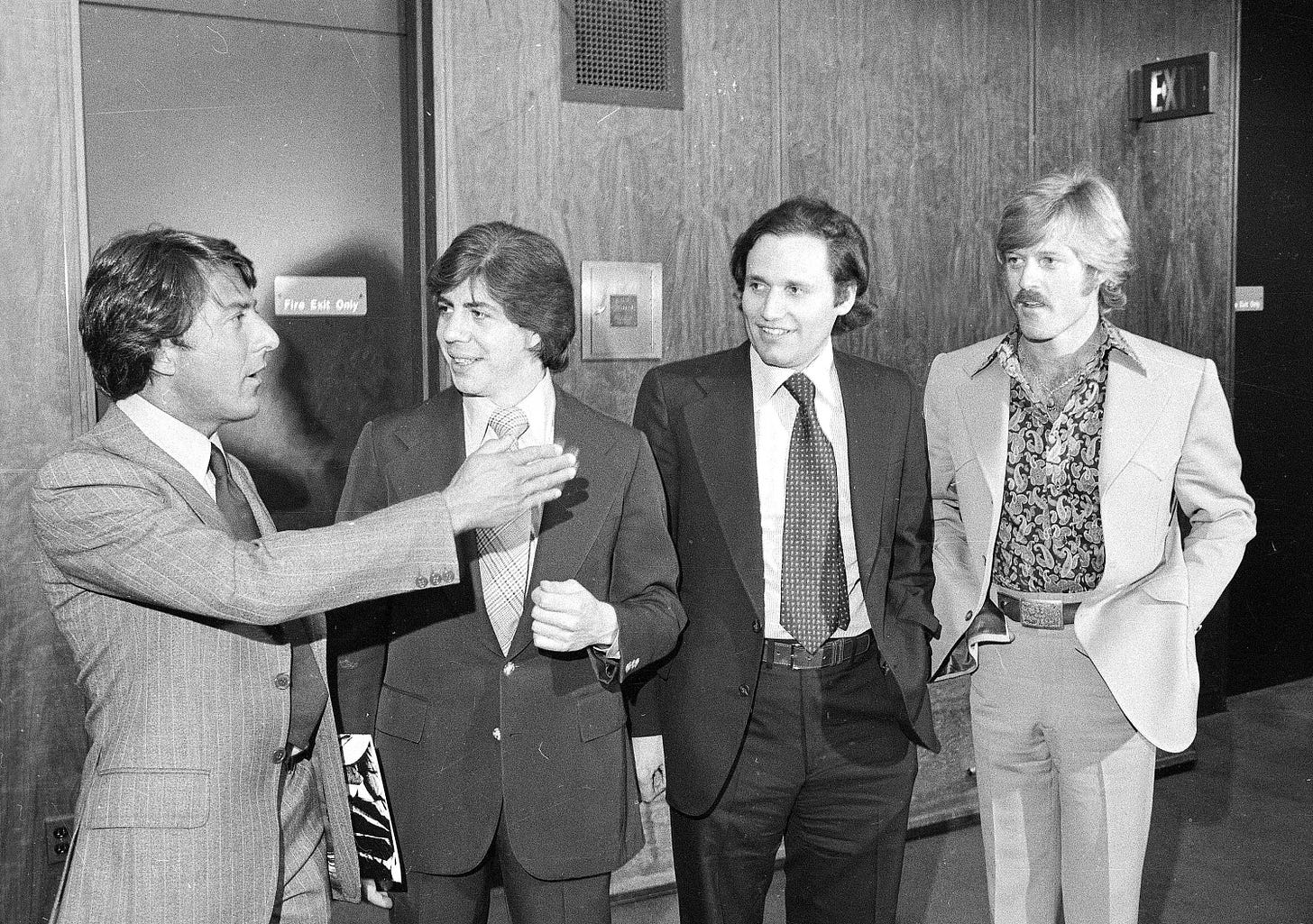
BOB WOODWARD:
After Nixon resigned, Katharine Graham wrote Carl and me a personal letter on a yellow legal pad:
“Dear Bob and Carl, You did some of the stories on Nixon. Now don't start thinking too highly of yourselves. And let me give you some advice: beware the demon pomposity.’”
We are a country, in many ways, infected with pomposity — in journalism, Wall Street, politics, Hollywood. Pomposity is smugness and self-satisfaction, and in journalism, you can’t feel smug or self-satisfied — because you don't know everything.
JON:
I want to tell people about Katharine Graham's Pulitzer Prize-winning memoir, Personal History. It pains all three of us that 22 years after her death, she is not remembered by as many Americans as she should be. She was the first woman to run a Fortune 500 company, among many other achievements. She was the towering figure of Washington for 40 years.
BOB WOODWARD:
And she was tough. That confidence– “Beware the demon pomposity.”
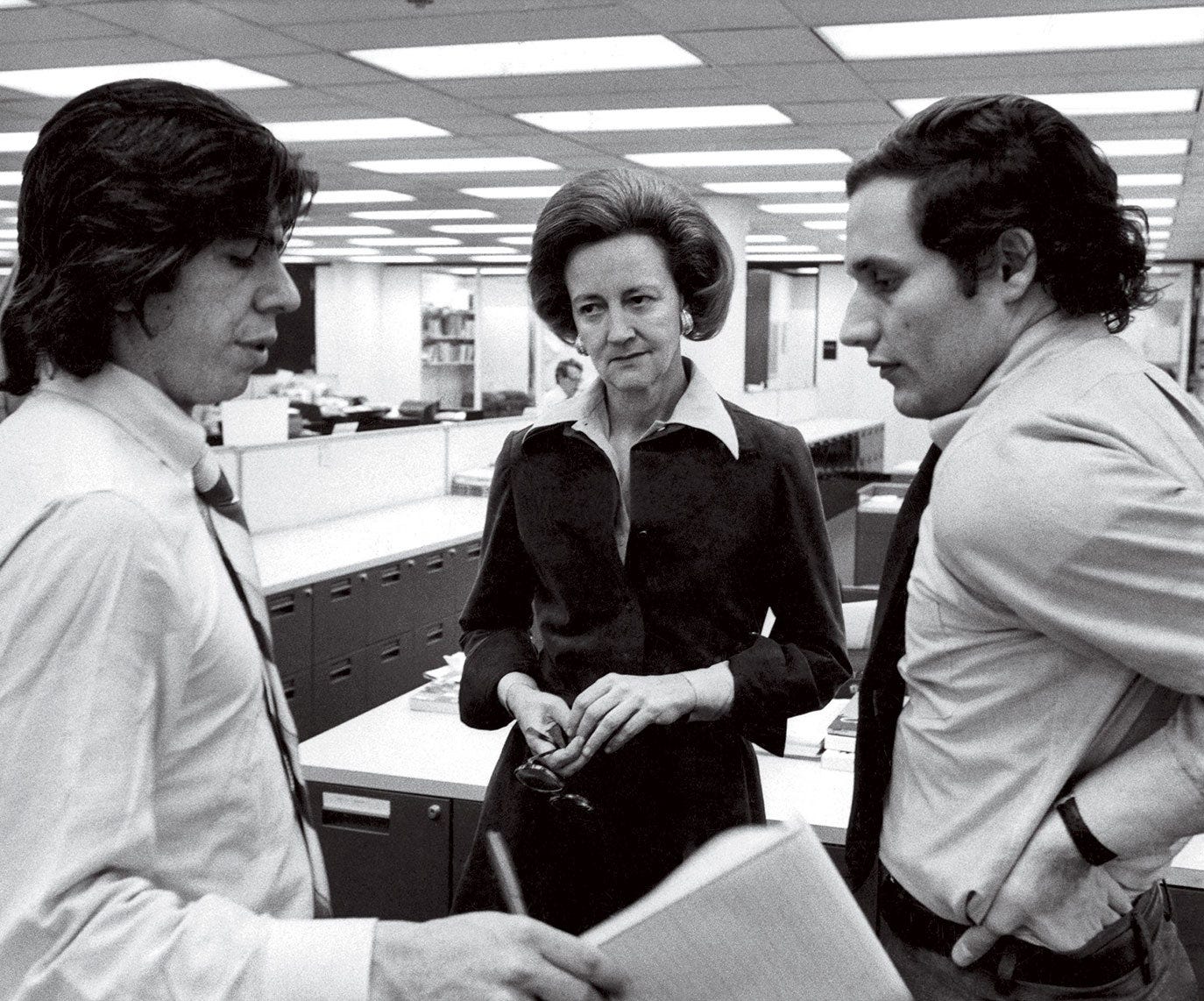
JON:
Carl was talking about Nixon's attitude toward the press. And you carry something around with you in your pocket from the Nixon tapes.
BOB WOODWARD:
[pulling a paper from his jacket]
So now I’m going to read from the Nixon Papers from September 14, 1972. This was after he was re-elected. The sabotage and espionage had worked. He had won 49 states. This is a moment of triumph and exuberance for Nixon. And this is where he recorded himself saying,
“Never forget: the press is the enemy, the press is the enemy, the press is the enemy. The establishment is the enemy. The professors are the enemy; the professors are the enemy. Write that on a whiteboard 100 times, and never forget it.”
That's Nixon speaking from head and heart. That’s Donald Trump also, 50 years later.
JON:
In your introduction to the new edition of All the President's Men, there is a cogent description of what Watergate meant and what it was about in a larger sense. It wasn't a third-rate burglary, as Nixon's press secretary called it. And the cover-up wasn't worse than the crime — you guys demolished that idea pretty well. You write that Watergate was essentially five wars. You already covered the war against the press, which has a distinctive antisemitic quality — Nixon mixed Jews and the press. But there was also, Carl, a war against the anti-war movement. What was that about?
CARL BERNSTEIN:
Nixon set out to destroy the antiwar movement at its height through another campaign of espionage and sabotage. The so-called COINTELPRO undertaking at the FBI involved breaking into people's homes.
JON:
And while Nixon didn't order the Watergate break-in, he did order other break-ins.
CARL BERNSTEIN:
He did. One year almost to the day before the Watergate break-in, the Nixon investigatory mafia had learned that, in a safe at the Brookings Institution, a Washington-based think tank, were some papers related to the Vietnam War and Lyndon Johnson. Nixon believed they would show that Johnson had been much more dishonest about the war in Vietnam than he, Nixon, had been accused of being by the anti-war movement. I'm oversimplifying a little bit.
Nixon then convened a meeting with Henry Kissinger and Bob Haldeman, the chief of staff to Nixon, in which he talked about the need to get those documents in the Brookings Institution. And here were his words.
“I don't care what you have to do to get the documents. Firebomb the goddamn place. Break in. Do what you have to do, but get the documents.”
Kissinger was absolutely silent. Haldeman, no retort. Another day or two later, he comes back to them. “Did you come up with a plan to break into Brookings?” [They never carried that one out].
JON:
So we’ve got the war against the media, the war against the antiwar movement. Then, the impetus of the break-in was the war against the Democrats.
BOB WOODWARD:
And then the fourth war was against the system of justice [the coverup]. The fifth war was Nixon's war against history. To say, “Watergate was just a blip, it was just a small thing.”
And he spent 20 years after he resigned until he died, trying to steer the story away from criminality and his responsibility.
JON:
Bob, you wrote a good book on Deep Throat — Mark Felt — called The Secret Man. But Carl mentioned COINTELPRO, which was a horrifying FBI program to spy on anybody who happened to be against the Vietnam War or in favor of the civil rights movement. And the person in charge of that horrible program, the person who was supervising the wiretapping of Martin Luther King, was Deep Throat.
CARL BERNSTEIN:
That’s a good call, Alter.
BOB WOODWARD:
The paradox is that Felt didn't like Nixon. He felt Nixon was abusing the FBI, but Felt was a [J. Edgar] Hoover man.
JON:
And Hoover’s death became a very important part of Watergate. We talked about the different motives of leakers. In Felt’s case, he was partly squeezed out bureaucratically after Hoover's death.
BOB WOODWARD:
The chronology is essential here. Hoover died in May of ’72. Felt was the deputy who was trying to get the job. And then Nixon realizes, This is not somebody I can control. So he put in somebody who had nothing to do with the FBI, L. Patrick Gray. And so part of Felt’s motive is personal, grave disappointment in not getting the directorship of the FBI, which he felt he was entitled to. And the Nixon administration did abuse the FBI. There's no question about that. He had confusing, understandable, but not forgivable motives.
JON:
I wanted to ask about the spycraft part of it because it's still such an amazing story. So, famously, when you wanted to talk to him, you would take a flowerpot with a red flag and move it on your balcony [near Dupont Circle].
BOB WOODWARD:
The FBI had spies on the whole embassy area of Washington. So he actually said to the agents, “When the flower pot’s out, let me know.” And that meant, “We're gonna meet in the underground car garage.”
JON:
People knew that he was talking to you?
BOB WOODWARD:
I don't think they knew. I think those who do counterintelligence work for the FBI have many tasks. They have lots of people who are sources in the embassy for them.
JON:
How would they figure out how to get a copy of your New York Times, go to page A20, and draw a clock with the hands at 3 AM — that's when we're meeting at the underground garage over the [Key] bridge in Virginia. How did they get to your New York Times?
BOB WOODWARD:
Because it was in my apartment building, right in the lobby.
JON:
So, would some kind of agent go in and grab your New York Times?
BOB WOODWARD:
You’ve got to remember that the FBI is a paramilitary organization.
CARL BERNSTEIN:
Especially the counterintelligence component.
BOB WOODWARD:
You read these stories about dead cops and Soviet spies and putting documents in the tree trunk. That’s what these people do for a living.
JON:
So, on the fifth war against history, Carl, you were about to make a historical context point.
CARL BERNSTEIN:
For the anniversary edition of All the President's Men, we enumerated very quickly what had happened and our belief at the time that never again would there be a president of the United States who had undertaken anything against the United States and its Constitution and the law such as had happened in Watergate. And then we wrote, “And then came Donald Trump.” The most important thing that we say about Trump is that he is the first seditious president in the history of the United States unless you are going to count Jefferson Davis, the President of the Confederacy. Think about what it means to have a president of the United States who is seditious, who undermines the very country and its system of laws, its system of governance, with loyalty only to himself.
Interestingly enough, on the 50th anniversary of [the Watergate break-in], the two of us were on the air together, talking not only about Watergate but also about the January 6th hearings.
“The most important thing that we say about Trump is that he is the first seditious president in the history of the United States unless you are going to count Jefferson Davis, the President of the Confederacy. “
JON:
What makes Trump even worse than Nixon?
CARL BERNSTEIN:
His ability to understand the weak spot in American democracy. As we say in this new introduction, George Washington, in his farewell address, warned of someone just like Trump.
BOB WOODWARD:
“The office would be held by unprincipled men.” Here’s George Washington, in 1797, literally realizing that the concentration of power in the presidency is so great, and the danger of unprincipled men is so high...
CARL BERNSTEIN:
And that, Washington said, is the weak spot — we cannot defend against that.
BOB WOODWARD:
Trump has bamboozled us — the public and reporters alike. He’s bamboozled us about the 2020 election being stolen. There is zero evidence, but we have adopted in a strange, bizarre way that only psychiatrists in ten years will be able to describe the idea of — let’s discuss the 2020 election.
It's absurd. There is nothing there. So when we say it’s a lie, we should also say there’s no evidence. I was talking to a bunch of lawyers the other day and asked. “Any of you ever have a case where the other side had no evidence?” And none of them raised their hand. This is a case of no evidence. We shouldn't even enter the room to discuss this with him.
JON:
What should Trump’s punishment be?
CARL BERNSTEIN:
Do you want it to be like any James Bond movie or...? I think that anything that allows the country to move forward without him being the president of the United States is punishment.
BOB WOODWARD:
The great British novelist Graham Greene said, “Don't despise your enemies.” They have a case. You need to listen to it. You need to understand it. You need to be patient with it. You don't have to agree. But you have to look at and absorb the counterarguments.
Carl asked me about the importance of listening. My wife Elsa and my assistant say, “You talk too much.” [Here, Woodward demonstrates how he uses one finger to pinch another to remind himself to shut up when a source is talking.]
JON:
I’m going to try that!
CARL BERNSTEIN:
It's all about getting the evidence. That's what reporting is. That's what the best obtainable version of the truth is. But it is not neutral.
BOB WOODWARD:
The similarity between Nixon and Trump is stunning. Sam Ervin asked the question, Why did this happen? And his answer fits Nixon and Donald Trump. His answer is a lust for political power. If you look at the Nixon tapes or study the last seven years of Trump, it’s a lust for power, for having it his way. And that's something for us to think about when politicians come down the line: Do they have this insatiable lust to win, to have the power? It's a disease.
JON:
Sam Ervin, in those same remarks, when asked to describe precisely what Watergate was, said that it was “a brazen and daring assault, led by Nixon himself, against the Constitution and the rule of law.” And that's what Donald Trump is continuing to try to do.
And that's why the stakes of the 2024 election are nothing less than democracy itself. I'm sorry to end on that sobering note. I hope any reporter attempting to cover this campaign covers not just the horserace but the stakes Carl and Bob laid out.
BOB WOODWARD:
It's important that you say that. Thank you.
JON:
Thanks, Bob. Thanks, Carl.




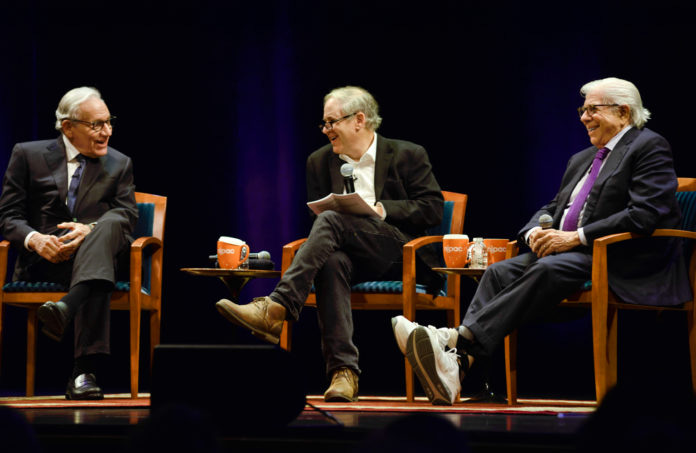
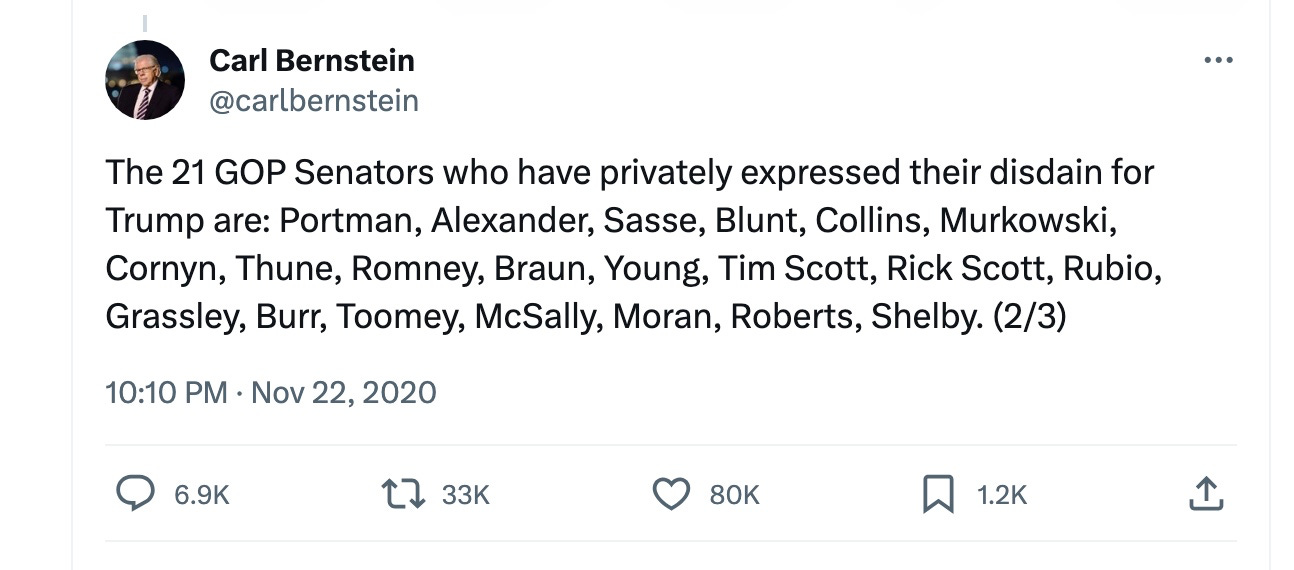
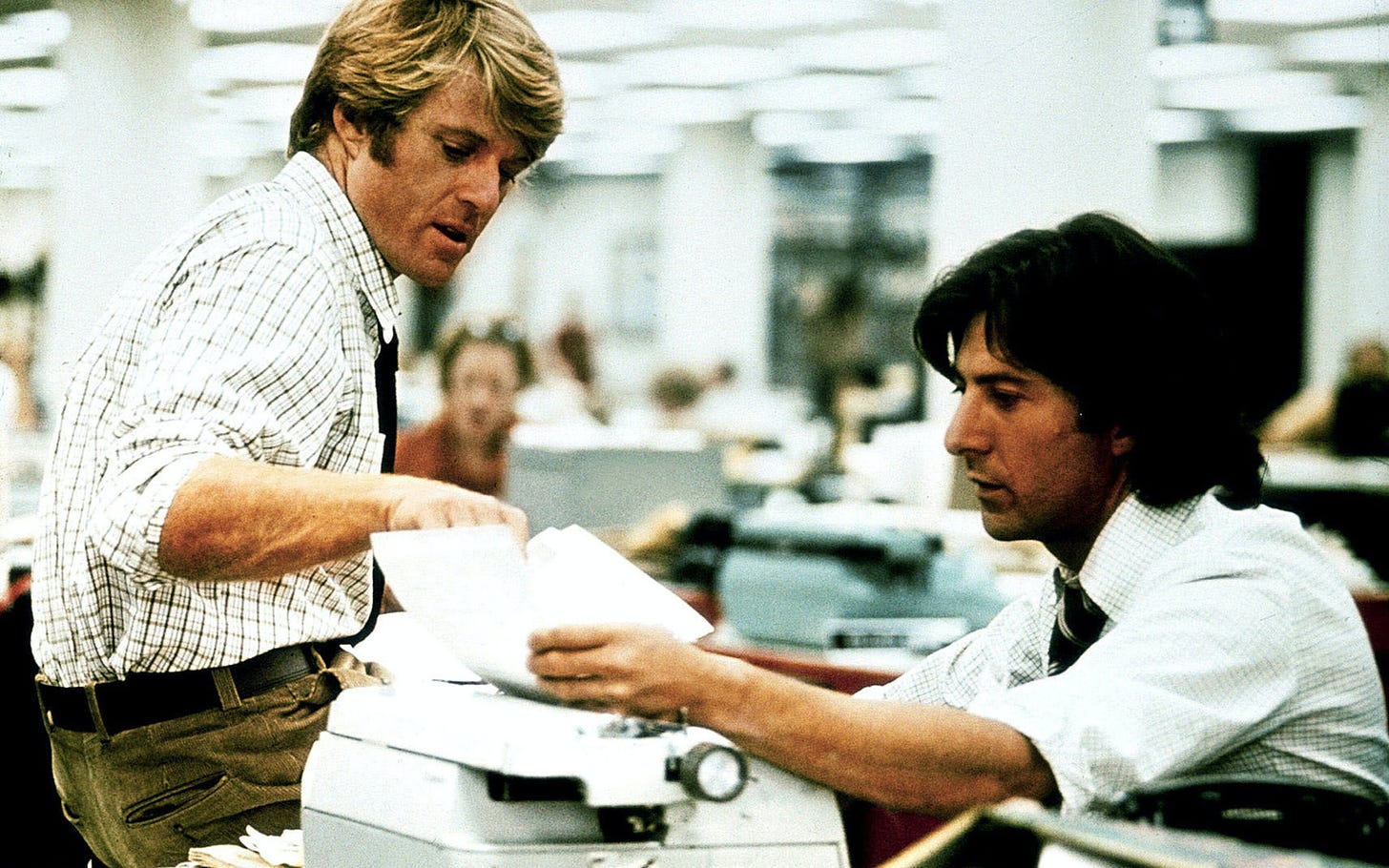

bravo jon, what an incredible conversation.
for the record, i have an autographed first edition of all the president’s men.
"There are, in the body politic, economic and social, many and grave evils, and there is urgent necessity for the sternest war upon them. There should be relentless exposure of and attack upon every evil man whether politician or business man, every evil practice, whether in politics, in business, or in social life. I hail as a benefactor every writer or speaker, every man who, on the platform, or in book, magazine, or newspaper, with merciless severity makes such attack, provided always that he in his turn remembers that the attack is of use only if it is absolutely truthful."
— President Theodore Roosevelt, 1906
Bob Woodward and Carl Bernstein carry on a great American tradition, once known as muckraking, that began in the 1880s and grew through about 1920. They resurrected the genre in the 1970s and became the new champions of investigative journalism.